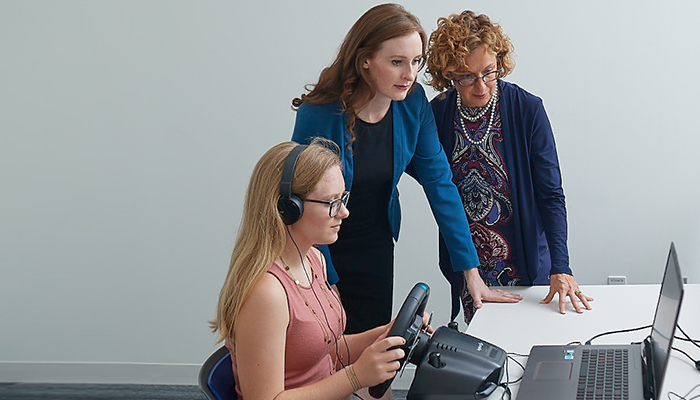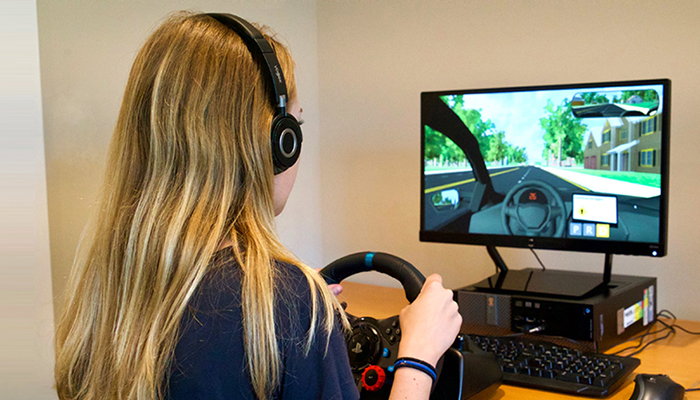HOW CAN WE HELP YOU? Call 1-800-TRY-CHOP
In This Section
Bringing Research to Action: Virtual Driving Assessment Program

Drs. Winston (right) and Walshe with teen taking the Virtual Driving Assessment.
mccannn [at] chop.edu (By Nancy McCann)
Becoming a driver is a path to independence for many teens. But this newly found freedom comes with a high price, as crashes are a leading cause of injuries and death for adolescents and young adults, with crash rates highest in the months following licensure due to inadequate experience and skills during the learner period.
Addressing the contributing factors to reduce teen driver crashes are researchers from the Center for Injury Research and Prevention (CIRP) at Children's Hospital of Philadelphia. Their decades-long research informed the implementation of the Virtual Driving Assessment (VDA) program in CHOP's Care Network. This innovative, first-of-its-kind program provides teens with a comprehensive evaluation of real-world driving skills in a safe, controlled environment. It identifies skills needed to be a safe driver and addresses the three most common serious crash risks: a lack of scanning needed to detect and respond to hazards, going too fast for road conditions, and being distracted by something inside or outside of the vehicle.
With a gift from NJM Insurance Group, a leading auto insurer and teen driver safety advocate, CHOP is offering the VDA as part of adolescent care during acute and well visits. Similar to hearing and vision screenings, teens 15 years and older are offered the VDA to measure their ability to drive safely and avoid crashes.
The implementation of the program into the Care Network is led by the CHOP Possibilities Project, which is reimagining pediatric care delivery to improve patient health outcomes. The Care Network leaders are helping to coordinate the initiative. The integration of the VDA in clinical care has undergone several iterations to make the current process seamless for clinical staff and patients.
Since June 2021, 11 CHOP Primary Care offices in Pennsylvania and New Jersey have offered the VDA, screening over 1,950 adolescents. Up to 11 more practices are expected to launch the program throughout the fall and winter.
"CHOP Primary Care is the first practice in the world to systematically evaluate teen driving," said Alex Fiks, MD, MSCE, director of Clinical Futures, which is a Center of Emphasis at CHOP Research Institute, and the Possibility Project. "Our partnership with NJM enabled us to allow our patients to benefit from decades of CHOP research, and it is an exciting opportunity for novice drivers to participate in engaging, interactive virtual driving and assessment in preparation for safe driving."
How it Works

The VDA provides teens with a comprehensive evaluation of real-world driving skills in a safe, controlled environment.
Working with CHOP spinout company Diagnostic Driving, Inc., CIRP researchers built and validated this assessment tool, which is powered by Ready-Assess™, a self-guided software program that systematically exposes drivers to the nation's most common, serious crash scenarios in a 15-minute virtual drive around town.
The experience is immersive, with participants using a steering wheel, headset, and pedals while following the course shown on a computer screen. After the completion of the virtual drive, teens receive personalized feedback on their crash-avoidance skills, including tips to improve and links to videos created by CHOP experts to develop specific driving skills. The goal is to help teens determine areas for improvement and to give them the resources they need to become safe drivers.
"It's in keeping with everything we do in primary care," said Lisa Biggs, MD, associate chief medical officer of the CHOP Care Network. "We offer our teen patients information they might not have gotten anywhere else about their driving, like 'You follow too closely' or 'You aren't scanning well, and there are ways to do it better.'"
So far, the VDA has been well received by families, as these teens attest:
“ This simulation gave me a chance to finally know what it's like behind the wheel. ”
- Charles, 16
“ It made me realize there were many things to pay attention to while driving ” - Kyra, 15
Research in the Works
Once fully operational across the CHOP Care Network, researchers plan to measure the program's effect on licensing and crash data among young people in New Jersey and Pennsylvania.
"Individual Differences in Driving," the first grant to leverage the implementation of the VDA in the Care Network, will be a longitudinal study led by Elizabeth Walshe, PhD, a research scientist who investigates how cognitive development in young drivers may influence driver safety, and Flaura Winston, MD, PhD, founder of CIRP and a leader of the CHOP Innovation Ecosystem Initiative.
The study team will use the VDA in the Care Network as part of their baseline assessment of driving skills at the outset of learning to drive. By looking at participants through this learning-to-drive process, the research team will assess what elements of development, personality, and cognition affect the ability to learn to drive, and eventually what elements affect driving after licensure.
"It's really important that we ensure patients at CHOP learn how to be safe drivers so they can avoid involvement in crashes and the negative health consequences of crashes," Dr. Walshe said. "This study will help us identify teens at higher risk for crashes, based on their individual factors, and inform how we tailor driver training for these groups of teens."
Applying Big Data to the Virtual Driving Assessment Program
In collaboration with colleagues in the Department of Biomedical and Health Informatics and the Arcus team, the project leverages CHOP Research Institute's data management expertise to anonymously link the VDA results and other research data to a patient's electronic health record. Researchers will dive deep into the data to learn how a teen's medical conditions and medications affect their driving in a way that can guide clinical pathways to reduce crashes.
"This is a whole new way to be thinking about driving," Dr. Winston said. "We need to remember driving is critical to a lot of teens that don't have access to public transit. In order for teens to reach their full potential, a lot of them need to drive. So what do we do with those situations to make sure that their first drive is a safe drive?"